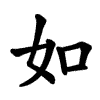Definify.com
Definition 2026
到
到
| ||||||
|---|---|---|---|---|---|---|
Translingual
| Stroke order | |||
|---|---|---|---|

| |||
| Stroke order | |||
|---|---|---|---|

| |||
Han character
到 (radical 18 刀+6, 8 strokes, cangjie input 一土中弓 (MGLN), four-corner 12100, composition ⿰至刂)
References
- KangXi: page 138, character 36
- Dai Kanwa Jiten: character 1950
- Dae Jaweon: page 314, character 13
- Hanyu Da Zidian: volume 1, page 334, character 3
- Unihan data for U+5230
Chinese
Glyph origin
| Historical forms of the character 到
| |||
|---|---|---|---|
| Oracle bone script | Bronze inscriptions | Large seal script | Small seal script |
 |
 |
 |
 |
| Characters in the same phonetic series (刀) (Zhengzhang, 2003) | |
|---|---|
| Old Chinese | |
| 刀 | *taːw |
| 忉 | *taːw |
| 鱽 | *taːw |
| 舠 | *taːw |
| 朷 | *taːw, *moːɡ |
| 叨 | *tuːw, *l̥ʰaːw |
| 倒 | *taːwʔ, *taːws |
| 到 | *taːws |
| 菿 | *taːws, *rtaːwɢ |
| 鞀 | *deːw |
| 鳭 | *rteːw, *teːw |
| 灱 | *hreːw |
| 菬 | *sdew, *tjewʔ |
| 超 | *tʰew |
| 怊 | *tʰew, *tʰjew |
| 欩 | *tʰew |
| 召 | *dews, *djews |
| 昭 | *tjew |
| 招 | *tjew |
| 鉊 | *tjew |
| 沼 | *tjewʔ |
| 照 | *tjews |
| 詔 | *tjews |
| 炤 | *tjews |
| 弨 | *tʰjew, *tʰjewʔ |
| 眧 | *tʰjewʔ |
| 韶 | *djew |
| 佋 | *djew, *djewʔ |
| 軺 | *djew, *lew |
| 玿 | *djew |
| 柖 | *djew |
| 紹 | *djewʔ |
| 袑 | *djewʔ |
| 綤 | *djewʔ |
| 邵 | *djews |
| 劭 | *djews |
| 卲 | *djews |
| 刁 | *teːw |
| 芀 | *teːw, *deːw |
| 貂 | *teːw |
| 蛁 | *teːw |
| 迢 | *deːw |
| 苕 | *deːw |
| 髫 | *deːw |
| 岧 | *deːw |
Phono-semantic compound (形聲, OC *taːws) : semantic 至 (“to arrive”) + phonetic 刀 (OC *taːw).
Etymology 1
|
simp. and trad. |
到 | |
|---|---|---|
Pronunciation
- Mandarin
- Cantonese (Jyutping): dou3, dou3-2
- Hakka (Sixian, PFS): to
- Min Dong (BUC): dó̤
- Min Nan (POJ): tàu / tò
- Wu (Wiktionary): tau (T2)
- Mandarin
- (Standard Chinese, Beijing)+
- Pinyin:
- Zhuyin: ㄉㄠˋ
- Wade-Giles: tao4
- Gwoyeu Romatzyh: daw
- IPA (key): /tɑʊ̯⁵¹/
-

- (Standard Chinese, Beijing)+
- Cantonese
- (Standard Cantonese, Guangzhou)+
- Jyutping: dou3, dou3-2
- Yale: dou, dóu
- Cantonese Pinyin: dou3, dou3-2
- IPA (key): /tou̯³³/, /tou̯³³⁻³⁵/
- Note: dou3-2 - “verbal suffix including action completion”.
- (Standard Cantonese, Guangzhou)+
- Hakka
- (Sixian, incl. Miaoli and Meinong)
- Pha̍k-fa-sṳ: to
- Hakka Romanization System: do
- Hagfa Pinyim: do4
- IPA: /to⁵⁵/
- (Sixian, incl. Miaoli and Meinong)
- Min Dong
- (Fuzhou)
- Bàng-uâ-cê: dó̤
- IPA (key): /tɔ²¹³/
- (Fuzhou)
- Min Nan
- (Hokkien)
- Pe̍h-ōe-jī: tàu / tò
- Tâi-lô: tàu / tò
- Phofsit Daibuun: daux, doix
- IPA (Xiamen): /taʊ²¹/, /tɤ²¹/
- IPA (Quanzhou): /taʊ⁴¹/, /tɤ⁴¹/
- IPA (Zhangzhou): /taʊ²¹/, /tɤ²¹/
- IPA (Taipei): /taʊ¹¹/, /to¹¹/
- IPA (Kaohsiung): /taʊ²¹/, /tɤ²¹/
- Note: tàu - vernacular; tò - literary.
- (Hokkien)
- Wu
- (Shanghainese)
- Wiktionary: tau (T2)
- IPA (key): /tɔ³⁴/
- (Shanghainese)
| Rime | |
|---|---|
| Character | 到 |
| Reading # | 1/1 |
| Initial (聲) | 端 (5) |
| Final (韻) | 豪 (89) |
| Tone (調) | Departing (H) |
| Openness (開合) | Open |
| Division (等) | I |
| Fanqie | 都導切 |
| Reconstructions | |
| Zhengzhang Shangfang |
/tɑuH/ |
| Pan Wuyun |
/tɑuH/ |
| Shao Rongfen |
/tɑuH/ |
| Edwin Pulleyblank |
/tawH/ |
| Li Rong |
/tɑuH/ |
| Wang Li |
/tɑuH/ |
| Bernard Karlgren |
/tɑuH/ |
| Expected Mandarin Reflex |
dào |
| Baxter-Sagart system 1.1 (2014) | |
|---|---|
| Character | 到 |
| Reading # | 1/1 |
| Modern Beijing (Pinyin) |
dào |
| Middle Chinese |
‹ tawH › |
| Old Chinese |
/*tˤaw[k]-s/ |
| English | arrive |
Notes for Old Chinese notations in the Baxter-Sagart system: * Parentheses "()" indicate uncertain presence; | |
| Zhengzhang system (2003) | |
|---|---|
| Character | 到 |
| Reading # | 1/1 |
| No. | 2115 |
| Phonetic component |
刀 |
| Rime group |
宵 |
| Rime subdivision |
1 |
| Corresponding MC rime |
到 |
| Old Chinese |
/*taːws/ |
Definitions
到
- to arrive at a destination; to reach a destination; to get to
- to go to; to leave for
- used as a verbal complement to indicate the (successful) completion of an action
- 找到 ― zhǎodào ― to have found something
- (usually in the negative) to reach
- to the extent that
- to
- to (a place)
- to (a time); until; up to
-
- 這家店從9點開到18點。 [MSC, trad.]
- 这家店从9点开到18点。 [MSC, simp.]
- Zhè jiā diàn cóng 9 diǎn kāi dào 18 diǎn. [Pinyin]
- This shop is open from 9 to 6 o'clock.
-
- 我們要把假期推遲到天氣好些的時候。 [MSC, trad.]
- 我们要把假期推迟到天气好些的时候。 [MSC, simp.]
- Wǒmen yào bǎ jiàqī tuīchí dào tiānqì hǎoxiē de shíhòu. [Pinyin]
- We shall delay our holiday until the weather is better.
-
- (from) ... to ...
- thoughtful; considerate
Synonyms
- (verbal complement indicating completion): (Min Nan) 著 (tio̍h)
Compounds
Derived terms from 到
|
|
Etymology 2
|
simp. and trad. |
到 | |
|---|---|---|
| alt. forms | ||
Pronunciation
- Min Dong
- (Fuzhou)
- Bàng-uâ-cê: gáu
- IPA (key): /kɑu²¹³/
- (Fuzhou)
- Min Nan
- (Hokkien)
- Pe̍h-ōe-jī: kàu
- Tâi-lô: kàu
- Phofsit Daibuun: kaux
- IPA (Xiamen): /kaʊ²¹/
- IPA (Quanzhou): /kaʊ⁴¹/
- IPA (Zhangzhou): /kaʊ²¹/
- IPA (Taipei): /kaʊ¹¹/
- IPA (Kaohsiung): /kaʊ²¹/
- (Teochew)
- Peng'im: gau3
- Pe̍h-ōe-jī-like: kàu
- IPA (key): /kau²¹³/
- (Hokkien)
Definitions
到 (Min)
References
Japanese
Kanji
到
Readings
Compounds
Synonyms
|
- Source: EDICT and KANJIDIC files licensed by the Electronic Dictionaries Research Group.
Proper noun
到 (hiragana いたる, romaji Itaru)
- A male given name
Korean
Hanja
到 • (do) (hangeul 도, McCune-Reischauer to)
- This term needs a translation to English. Please help out and add a translation, then remove the text
{{rfdef}}.
Vietnamese
Han character
到 (đáo, đáu, tráo)
- This term needs a translation to English. Please help out and add a translation, then remove the text
{{rfdef}}.